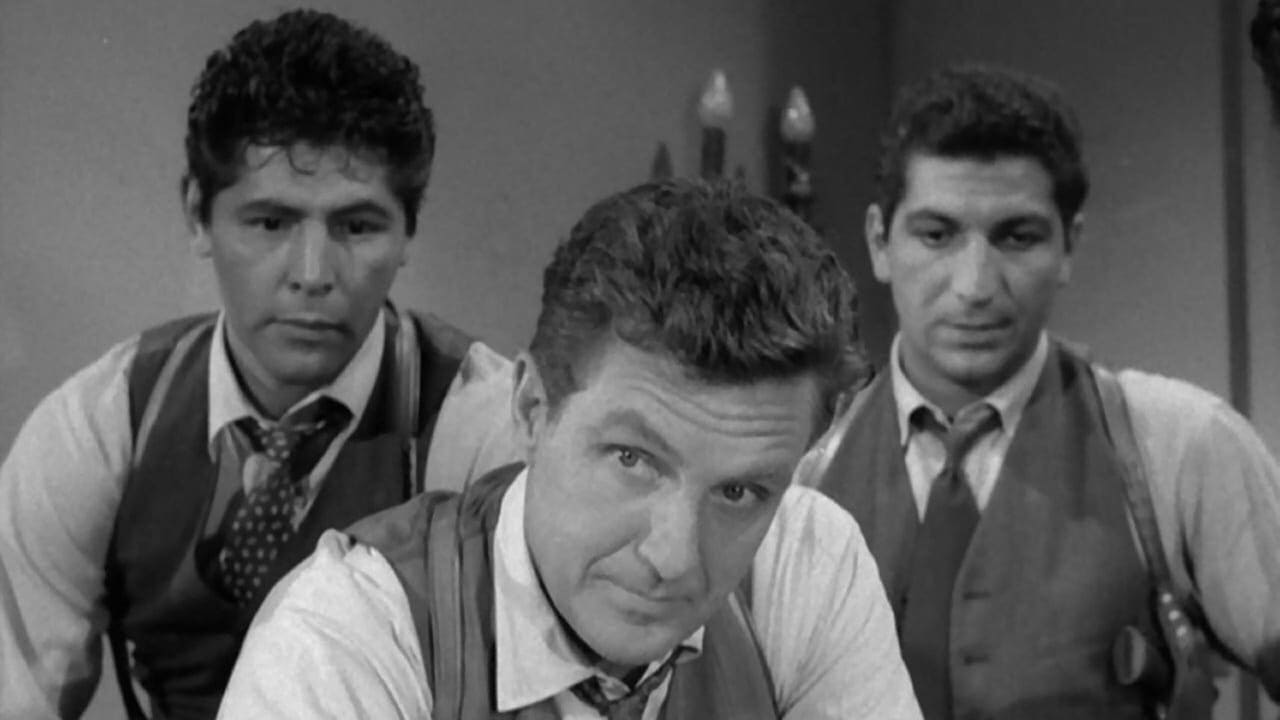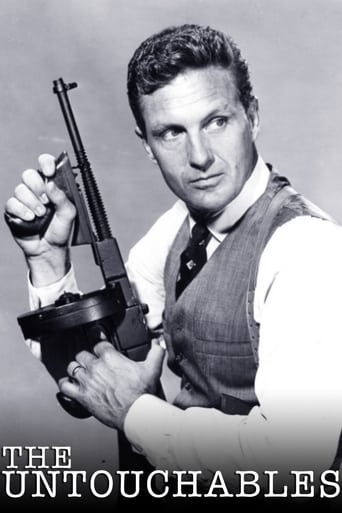

"The Untouchables" is a show that has aged well, as the shows are still quite enjoyable today. And, even today, a few of the episodes are a bit shocking due to their violence...something that brought this Desilu series a lot of attention back in the day. Killings are often shown vividly and bad guys are, in an odd way, the stars of the show. As for Eliot Ness (Robert Stack), his part in most episodes is actually rather limited...as was Stack's acting range and emotional expression. Mostly, he and his men just appeared here and there and the very charismatic baddies killed each other! And, it's all VERY entertaining due mostly to the writing and broadness of the acting by the guest thugs each week.Not every episode is a winner and a few of the early ones are poor historically speaking because they claim to be about real life villains (such as Ma Barker and Pretty Boy Floyd) but bear almost no resemblance to these folks. They ARE very entertaining...but also complete fabrications...and much of it because the real life Ness had nothing to do with bringing these folks to justice. Despite this, I generally preferred the earlier episodes because later it seemed as if the writers had a hard time coming up with new plots and so they kept featuring Frank Nitti. Again and again, Nitti would somehow avoid capture...while the baddie of the week almost always ended up dead or in prison. Still, however, these shows, while weaker, were quite entertaining as well...just not to the same degree as the earlier ones.
... View MoreChicago during the dry years (prohibition) was a venue which had a very rough exterior. Morally rigid guidelines, and a facet of poverty comprising of reprehensible destitution were unfortunate elements of American living which initiated an irascible backlash of pandemic criminal activity. Such tumultuous and illegal shenanigans embodied some extremely visceral emotions with hundreds of thousands of people who lived in Chicago! The television show "The Untouchables" dealt with hard bitten reality which evoked agitated behavior on both sides of the law! Elliot Ness was on a vigilante crusade to stop the flow of liquor into Chicago during the Prohibition era! As it turns out, Elliot Ness himself died of a heart attack which was attributable to his alcoholism! What is the point of this information? Not to depict Ness as a hypocrite, rather, to reiterate that Elliot Ness believed in enforcing the law, regardless of what his position was on any given social issue! The series, "The Untouchables" is an historically succinct account of how Al Capone ruled Chicago during a specific era! The federal agents were either bought off, or, like Ness, they were motivated by disdain and vehement objection for key members of the syndicate who were repetitively thwarting them! An onslaught of prominent actors and actresses made guest appearances on "The Untouchables". This made the series very powerful!! These special guest stars played the roles of Ness' scruple-less adversaries! More often than not, Ness would engage in an ideological diatribe with these criminals. In turn, these ruthlessly calm and collective masterminds of financially lucrative chicanery would emphatically ameliorate their reckless actions by blaming either their environment, or, the nation's prevailing circumstances! A couple of guest stars' appearances won Emmy awards for their segment performances on this series. (Elizabeth Montgomery and Robert Redford) The directing for "The Untouchables" focused on being extremely authentic! The narrating by Walter Winchell added a very wry and supercilious touch to the entire plot of each week's episode! The acting by guest stars and regulars (like Robert Stack) was outstanding! (Especially for the small screen). Chicago, in the twenties and thirties, was a city that cultivated it's identity by making nefariously illicit and felonious escapades their precariously notorious trademark!! The series "The Untouchables" illustrated such copious crimes with a very vividly pejorative and fatalistic disposition!! I loved this show, one of my favorites in all of television!! Mostly on account of the fact that as a Chicagoan, the show "The Untouchables" exudes a very definite and cynical identifiability!
... View MoreAlthough the reputation of The Untouchables is that it is about prohibition, there are more stories about murder and extortion than about the alcohol trade, which is a background in many stories, but central to only a handful.These bad guys are really bad. Not only are there the commonplace shootings, but people have their cars blown up. They are knifed in the back. They are strangled in the back seats of cars. They are blinded when acid is thrown in their faces. They are hanged. They are set on fire. Good friends and reliable employees have their lives snuffed out with the villain employing less thought than he would spend on selecting the right tie to wear. As Frank Nitti (exquisitely played by actor Bruce Gordon) put it, while plotting the murder of a young man who worked tirelessly to make Nitti's enterprises succeed, "It's a matter of economics. Two of these (displaying bullets) cost 15 cents." While Frank Nitti is the best known of the criminals in this outstanding series, he appears in a tiny minority of the stories, about 25 of 118. Other actors with different personalities but equivalent levels of viciousness terrorize the innocent and not-so-innocent with levels of violence that are shocking even today, and were surely even more shocking in the 50s and early 60s.While Bruce Gordon as Frank Nitti is the best remembered portrayer of gangsters from this show, in other episodes, veteran actors like William Bendix and Nehemiah Persoff, and then-young actors like Martin Landau and Robert Redford, put on entertaining and gritty performances that rarely disappoint. All the while, the newsreel style announcing of Walter Winchell adds enormously to the sensation of reality.Today's viewer has the fun, not available to the viewers back then, of frequently spotting future stars in the cast, like Alan Hale Jr.(Skipper on Gilligan's Island), Elizabeth Montgomery (Samantha on Bewitched), Carroll O'Connor (Archie Bunker on All In The Family), Gavin McLeod (Capt. Steubing on The Love Boat), Jack Warden (veteran of countless movies and TV shows), Lee Van Cleef (perennial star and costar of westerns), Peter Falk (Columbo), Raymond Bailey (Mr. Drysdale on The Beverly Hillbillies -- without his toupee). The list goes on and on.Two often-made criticisms of the show are justified, but to my mind, unimportant. First, it is true that in real life Eliot Ness never met most of the notorious criminals that he and his men defeat on the show. However, the show is admitted to be fictional. Second, it is true that the characters of the good guys, Ness and crew, are not particularly colorful. However, the gangsters and their victims provide ample color, and the solid steadfastness of Robert Stack as Eliot Ness and the rest of his crew gives viewers an anchor of emotional security in the face of the omnipresent evil portrayed on the show. Without this, the helplessness of the victims in the face of the ruthlessness, treachery and cold-heartedness of the villains that dominate the show episode after episode might be difficult to bear.Everyone will benefit when the operators of networks that play reruns of old series finally decide to put real quality before the viewers and begin to regularly show The Untouchables, The Fugitive, Rawhide, and the other real classics of years past.
... View MoreThe 118 hour-long episodes (appropriately in B&W) of the crime drama "The Untouchables" were originally broadcast on ABC from 1959-1963. The first 16 episodes of Season Two are listed below with their original air dates.The series was promoted as a docudrama-type presentation based on the real-life cases of government agent Eliot Ness (Robert Stack) during the 1930's. Despite this claim the promoters took considerable liberties with the actual history of Ness's squad of "Untouchables" (incorruptible) as well considerable dramatic license as every G-man vs the mob cliché and caricature was incorporated into stories. The style is less like a docudrama than the screaming headlines of a scandal focused Hearst newspaper from the era; complete with a Walter Winchell's newsreel-like narration. But this added zip to the series and made it a big hit. The many stereotypes simply made the story telling more efficient and did not interfere with the viewer getting into the story. The episodes are of two basic types; macro (big-name crime bosses) and micro (innocents and low-level hoods caught up in forces over which they have little control). Although the macro type episodes are the ones most subject to historical liberties, both types work reasonably well and the ability of the series to shift between them gave the writers a lot more potential material to work with and in part accounted for the series not running out of gas after just a season or two. Stack and the actors playing his main agents generally remain intact from the first season. These include Nick Georgiade as Rossi, Paul Picerni as Hobson, Steve London as Rossman, Abel Fernandez as Youngfellow, and Jerry Paris as Flaherty. Frank Nitti (Bruce Gordon) was the most prominent of the villains. Apparently the series was an annoyance to then F.BI. head J. Edgar Hoover, who frequently had to explain that Ness and his men were agents of the Treasury Department, not the FBI. Then again, what do I know? I'm only a child.The Rusty Heller Story: 13 October 1960, Jack 'Legs' Diamond: 20 October 1960, Nicky: 30 November 1960, The Waxey Gordon Story: 10 November 1960, The Mark of Cain: 17 November 1960, A Seat on the Fence: 24 November 1960, The Purple Gang: 1 December 1960, Kiss of Death Girl: 8 December 1960, The Larry Fay Story: 15 December 1960, The Otto Frick Story: 22 December 1960, The Tommy Karpeles Story: 29 December 1960, The Big Train: Part 1: 5 January1961, The Big Train: Part 2: 12 January 1961, The Masterpiece: 19 January 1961, The Organization: 26 January 1961, The Jamaica Ginger Story: 2 February 1961
... View More